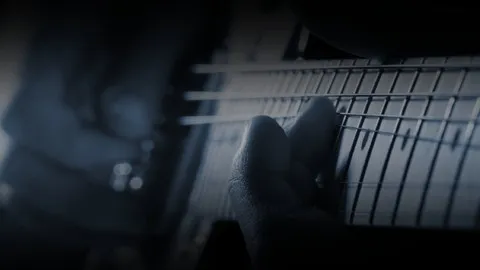
Free Blues Guitar Tutorial - 15 Essential Blues Guitar Licks 
This free course provides an introduction to blues guitar, teaching 15 essential licks to help you master the classic blues sound. ▼
ADVERTISEMENT
Course Feature
![]() Cost:
Cost:
Free
![]() Provider:
Provider:
Udemy
![]() Certificate:
Certificate:
No Information
![]() Language:
Language:
English
![]() Start Date:
Start Date:
Self Paced
Course Overview
❗The content presented here is sourced directly from Udemy platform. For comprehensive course details, including enrollment information, simply click on the 'Go to class' link on our website.
Updated in [April 29th, 2023]
This course provides an overview of the essential blues guitar licks. Students will learn how to improve their knowledge of blues lead and rhythm guitar, as well as their lead guitar phrasing and note selection. They will also learn how to enhance the "feel" of their playing, use chord tones in solos, and incorporate great blues licks into their own solos. Additionally, students will gain a better understanding of the fretboard and enhance their general lead and rhythm guitar skills.
[Applications]
After taking this course, students should be able to apply their newfound knowledge of blues guitar to their own playing. They should be able to use chord tones in their solos, as well as incorporate the blues licks they have learned into their own solos. Additionally, they should have a better understanding of the fretboard and be able to use their lead and rhythm guitar skills more effectively.
[Career Paths]
1. Blues Guitarist: A blues guitarist is a musician who plays the blues on the guitar. They are typically skilled in improvisation, and often use techniques such as bending strings, vibrato, and hammer-ons to create a unique sound. As the popularity of blues music continues to grow, so does the demand for blues guitarists.
2. Music Producer: Music producers are responsible for overseeing the production of music recordings. They are responsible for selecting the musicians, arranging the songs, and ensuring that the recordings are of the highest quality. As the music industry continues to evolve, the demand for music producers is expected to increase.
3. Music Teacher: Music teachers are responsible for teaching students how to play instruments, read music, and understand music theory. They often work in schools, universities, and private music studios. As the demand for music education continues to grow, so does the demand for music teachers.
4. Music Composer: Music composers are responsible for creating original music for films, television shows, video games, and other media. They often work with directors and producers to create music that fits the mood and tone of the project. As the demand for original music continues to grow, so does the demand for music composers.
[Education Paths]
1. Bachelor of Music: This degree path provides students with a comprehensive understanding of music theory, composition, and performance. Students will learn about the history of music, music theory, and the fundamentals of music production. Additionally, they will gain experience in the recording studio and learn how to use digital audio workstations. This degree path is ideal for those looking to pursue a career in music production, composition, or performance.
2. Bachelor of Arts in Music: This degree path focuses on the study of music from a cultural and historical perspective. Students will learn about the history of music, music theory, and the fundamentals of music production. Additionally, they will gain experience in the recording studio and learn how to use digital audio workstations. This degree path is ideal for those looking to pursue a career in music education, musicology, or music therapy.
3. Master of Music: This degree path provides students with an advanced understanding of music theory, composition, and performance. Students will learn about the history of music, music theory, and the fundamentals of music production. Additionally, they will gain experience in the recording studio and learn how to use digital audio workstations. This degree path is ideal for those looking to pursue a career in music production, composition, or performance.
4. Master of Arts in Music: This degree path focuses on the study of music from a cultural and historical perspective. Students will learn about the history of music, music theory, and the fundamentals of music production. Additionally, they will gain experience in the recording studio and learn how to use digital audio workstations. This degree path is ideal for those looking to pursue a career in music education, musicology, or music therapy.
Course Syllabus
Introduction
Blues Rhythm Guitar
About Blues Soloing
Solo Breakdown - Licks 1-7
Solo Breakdown - Licks 8-15
Summary And Further Study
Pros & Cons

Clear explanations, great teaching environment, engaging instructor, useful licks

Well explained, perfect for intermediate and advanced blues learners.

Stretched feeling, no response to message, no rig set up info.
Course Provider

Provider Udemy's Stats at AZClass
Discussion and Reviews
0.0 (Based on 0 reviews)
Explore Similar Online Courses

Communication Skills for Engineers

Cocos2d-x v3 JavaScript - Game Development Series

Python for Informatics: Exploring Information

Social Network Analysis

Introduction to Systematic Review and Meta-Analysis

The Analytics Edge

DCO042 - Python For Informatics

Causal Diagrams: Draw Your Assumptions Before Your Conclusions

Whole genome sequencing of bacterial genomes - tools and applications

Master Guitar In 90 Days: Step-By-Step Lessons For Beginners

Acoustic Blues Guitar Lessons : Learn Blues Guitar


Start your review of Free Blues Guitar Tutorial - 15 Essential Blues Guitar Licks